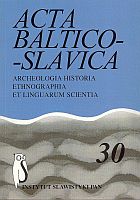Роль категории определенности.неопределенности в развитии прилагательного в древнерусском и литовском языках
The Role of the Definiteness / Indefiniteness Category in the Development of Adjectives in Old Russian and Lithuanian
Author(s): Svetlana VlasovaSubject(s): Language and Literature Studies
Published by: Instytut Slawistyki Polskiej Akademii Nauk
Keywords: definiteness / indefiniteness category; simple and pronominal adjective forms; adjective form semantics; 12th – 13th century Uspensky Codex; contrasting with Lithuanian
Summary/Abstract: The author makes an attempt to clarify the basis of the development of simple and pronominal forms in the Lithuanian and Russian languages, as their primary meanings were identical. The Uspensky Codex (dating to the 12th–13th centuries; referred to as UC thereafter) is analysed in the article, as simple and pronominal forms of adjectives were still used at that period to express the definiteness / indefiniteness category. Comparison of Modern Lithuanian and Old Literary Russian language texts allows distinguishing phonetic similarity existing between pronominal forms of adjectives in both the languages and predetermining their similar functioning. The author proves in the article that pronominal forms used in the UC, similarly to those of Modern Lithuanian, have two basic functions, i.e. distinctive and directive. Due to inseparable pronoun-adjective joining, close and complex relations have developed between the meaning of definiteness and the semantics of different groups of adjectives. It is often the very lexical meaning of the adjective that individualises an object, distinguishes it out of the class of other same-class objects and enables marking it as a known object, thus making it definite. Distinctive semantics of adjectives would often determine sole usage of pronominal forms. Therefore, pronominal forms started displacing simple forms, and adjectives of some classes are totally devoid of simple forms. In modern Lithuanian, an interrelation is also noticed between the possibility of making pronominal forms and classes of adjectives. It should be noted that this relationship is reciprocate in Old Russian and Modern Lithuanian. The category of definiteness is constantly expressed in the UC using pronominal forms in the cases where it has already been previously expressed with the help of other devices, i.e. demonstrative and possessive pronouns, proper names or lexical word meanings. This tendency has resulted in spreading of pronominal forms, and they became primary forms in Russian. It is vice versa in Lithuanian: when definiteness is expresses using lexical devices (e.g., relative, diminutive and compound adjectives), such forms are not used or used constantly (with proper names, demonstrative pronouns and appeals). For this reason (neutralisation), simple forms started dominating in Lithuanian over pronominal ones.
Journal: Acta Baltico Slavica
- Issue Year: 2006
- Issue No: 30
- Page Range: 181-198
- Page Count: 18
- Language: Russian

